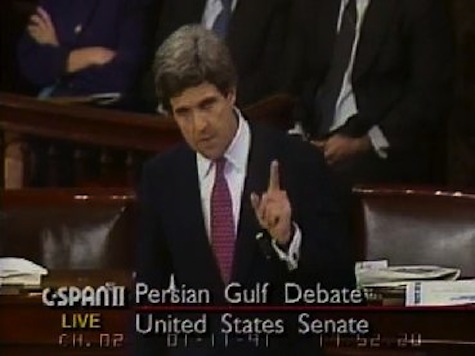Has John Kerry ever been right about any foreign policy issue, ever, when it counted?
On Jan. 11, 1991, Sen. Kerry took to the floor of the Senate to oppose the Gulf War and oppose the resolution authorizing President George H.W. Bush to use force to end Saddam Hussein’s brutal occupation of Kuwait.
“It is not, in my view, imperative that in the next few days we send soldiers to fight a war,” Sen. Kerry declared.
Instead of the American-led “new world order” that Bush seemed to be creating, Sen. Kerry said, the United States should aim for a different kind of “new world order”–one that emphasized the “collective security” efforts of the United Nations, and one that rejected a “Pax Americana” in favor of a multipolar internationalist system.
Sen. Kerry’s case against the war was that other options had not yet been exhausted. He urged that sanctions be given longer to work, arguing that since Saddam Hussein was not “winning” and the U.S. was not “losing,” the status quo could be tolerated. (He neglected to mention ongoing atrocities in Kuwait or threats to U.S. allies.)
In addition, Sen. Kerry argued, President Bush had not been sufficiently deferential to Congress. He had already sent so many troops to the region that many in Congress were under duress to offer their support, Kerry said. Peppering his 36-minute address with numerous references to the Vietnam War, he insisted that Congress had to be allowed to arrive at its own “independent” assessment of the options before war could be launched.
Sen. Kerry did not apply the same standard to President Barack Obama’s war in Libya in 2011, which was launched without consultation of any kind with Congress, much less a resolution authorizing the use of force.
Notably, Sen. Kerry also blasted Syria’s “support for terrorism.” He took quite a different tack in 2009 when, as chair of the Senate Foreign Relations Committee, he led efforts to reach out to the Assad regime.

COMMENTS
Please let us know if you're having issues with commenting.